Your skin is the reflection of your lifestyle.
Someone with skin problems could find it discouraging to observe others who have really unhealthy lifestyles and nevertheless have clear skin.
You may have a number of friends who frequently consume junk food, don’t even properly wash their faces, and take no particular measures to maintain good skin health but still have clearer skin than you.
Some people naturally have clear skin. Their lifestyle may have very little impact on their skin. The same might not be the case for everyone.
It depends on many factors such as your skin type, hormonal balance, hereditary and overall health. So if you are someone who’s struggling to have clear skin, you need to make some changes in how you live your daily life.
Many people fall short in their efforts to keep doing this. It’s not at all simple to stay outside of your comfort zone and change the way you live. However, there are multiple benefits to making those modifications because they not only improve the condition of your skin but also your whole well-being.
In this article, we will be discussing some of those lifestyle changes that can be a game-changer for your skin health. So let’s get started.
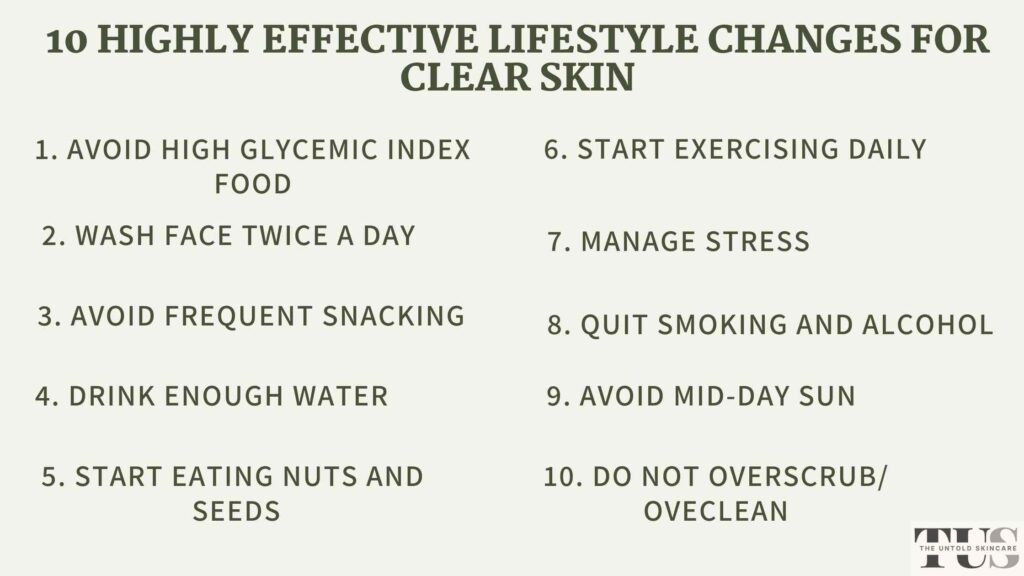
Avoid Foods with High Glycemic Index
Diet is probably the most important factor for clear skin. If done right, a proper diet can completely change how your skin looks.
Foods with high glycemic index are the biggest culprits. Glycemic index is basically a measure of food’s ability on how quickly it increases your blood sugar level.
High GI foods are rapidly digested into glucose (sugar) and can cause a rapid rise in blood sugar. Our body releases a hormone called Insulin that tends to bring the sugar level down by sending the sugar to body cells for storage. This is where all the troubles begin.
Higher insulin level causes the pores on the skin to secrete more sebum which results in acne and breakouts. The higher level of this hormone also causes hormonal imbalance that again multiplies the issue.
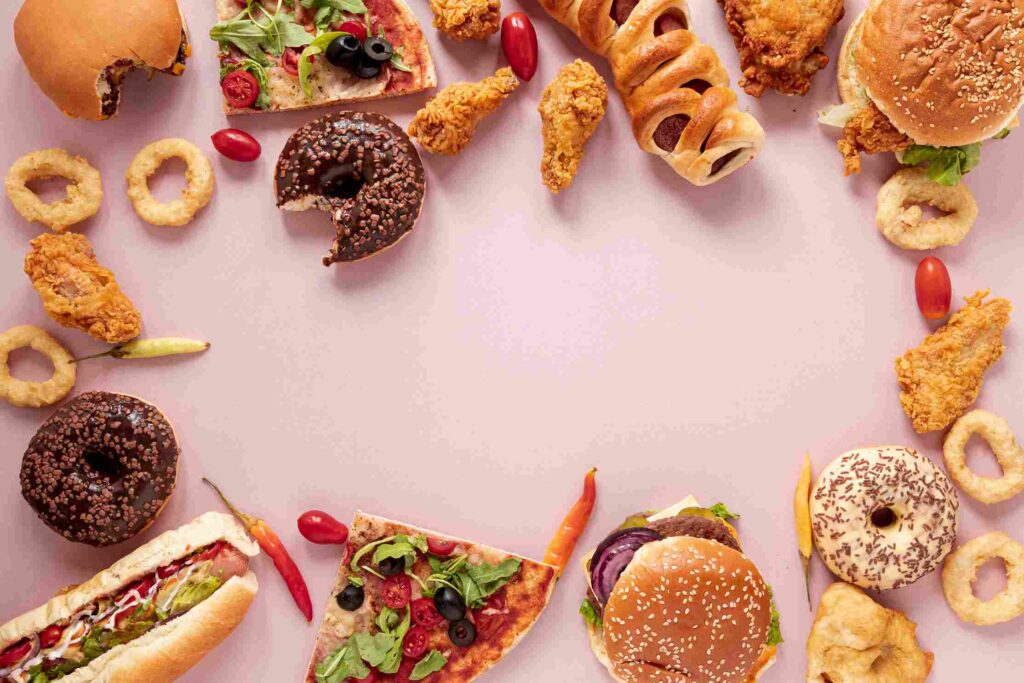
Protein or fat when gets combined with sugar forms Advanced Glycation End Products (AGEs) that damage the collagen. Collagen is a protein that is responsible for keeping our skin strong and providing elasticity.
Refined Carbohydrates are the ones with really high glycemic index. White bread, white rice, refined sugar and any other food made from their combination like doughnuts, cake, candies, etc. should be avoided.
Increase daily consumption of fruits and veggies as they are very low in glucose and also contain varieties of necessary nutrients that are crucial for skin health.
A minor but effective practice is to eat fruits in pieces rather than drinking fruit juice as the juice is quickly digested and can raise blood sugar levels.
Also Read: 6 Worst Food Combinations for Skin Health
Wash Your Face TWICE a Day
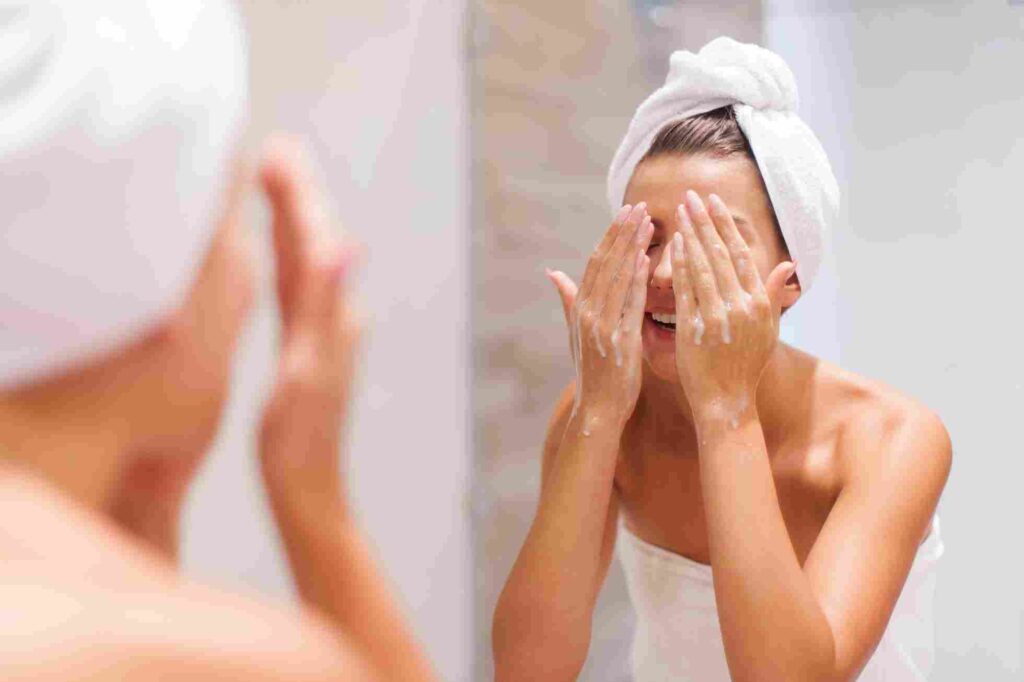
Washing the face is one of the most important steps in your skincare routine.
However, a common confusion among lots of people is how often to wash. And the answer is TWICE A DAY.
Cleanser is the only thing that needs to be changed but the frequency of washing remains the same, regardless of the skin type that you have.
Human skin detoxifies itself while we sleep building up toxins in the skin in the form of dirt and oil. So washing your face in the morning is important to clean those kind of toxins.
Also, it is important to wash your face at night to clean all the dirt and dead skin cells that accumulate throughout the day.
If you have normal or dry skin, you can just cleanse with water in the morning but do not skip using a proper cleanser at night. A non-foaming gel-based cleanser is the best option for people with dry skin.
But if you have oily skin, you just can’t skip the morning cleanser wash too. Some people like to wash their face more than twice a day but it is not usually recommended.
Washing your face quite often can kill the friendly bacteria living on your skin, removes the necessary natural oils and can also break the skin barrier.
The only time you can add a third time is if you exercise during the day and need to wipe away sweat.
For oily skin, a gentle foaming cleanser with ingredients like salicylic acid is the best fit.
For acne-prone skin, try using a gentle cleanser with benzoyl peroxide in it.
It is highly recommended to use a good quality moisturizer after having a face wash. It provides the necessary moisture to your skin and helps to balance the oil production. Ceramide-based moisturizers are the best choice.
Avoid Frequent Eating/Snacking
Most people absolutely have no idea how important it is to avoid frequent eating for skin health. It is a much-needed lifestyle practice for getting clear skin.
Frequent eating is a proven cause of increased blood sugar which in turn increases the body’s insulin level. This high insulin level results in excess production of sebum and can cause acne and breakout.
This is why intermittent fasting has become so popular nowadays. Try to avoid morning breakfast and reduce the habit of unnecessary snacking. Try reducing your eating frequency to 2 (max 3) times a day.
Drink Enough Water Daily
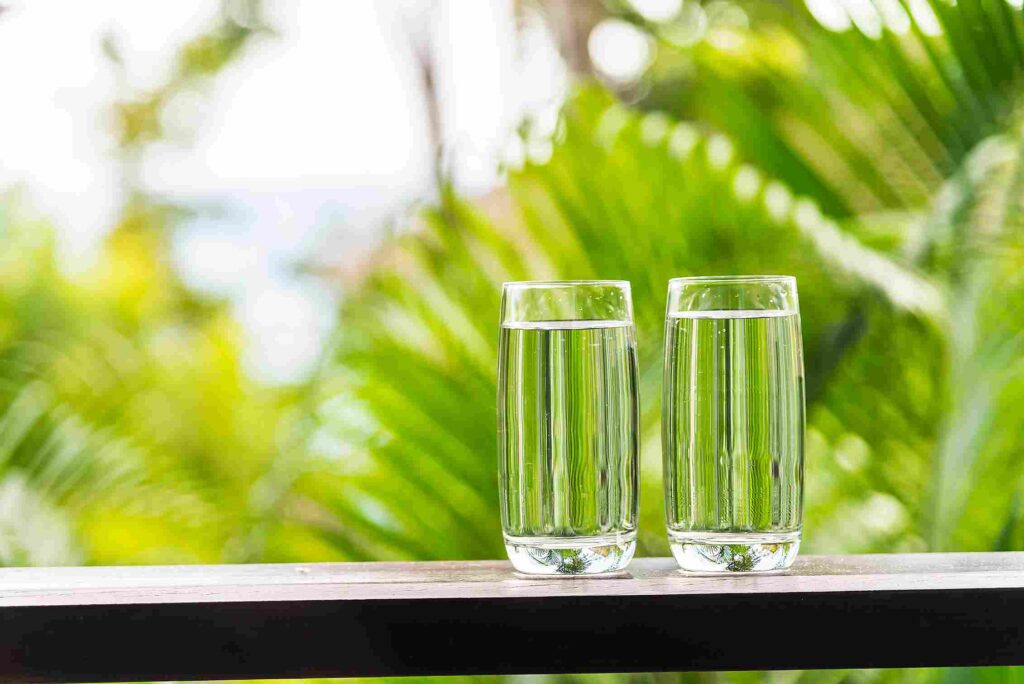
You might have heard this a million times before. Drinking enough water daily is absolutely vital for getting clear and healthy skin.
Its importance is such that other lifestyle changes that you follow may not work if your body lacks enough water.
Water hydrates your skin from the inside out, keeping it hydrated, supple, and plump. It acts as a natural detoxifier that helps to detoxify the body by flushing out toxins. It also improves blood circulation, ensuring that all the essential nutrients reach your skin cells.
Water also helps to balance the skin’s oil production since dehydration triggers the skin to produce more oil. It is also essential for body’s healing process since it quickens the healing of wounds, acne and scars.
Drinking enough water is essential for having the healthiest skin possible. If I had to quantify it, I would say that you should consume 4 liters of water per day, although many people believe that 2 to 3 liters is adequate.
Quit Smoking and Alcohol Intake
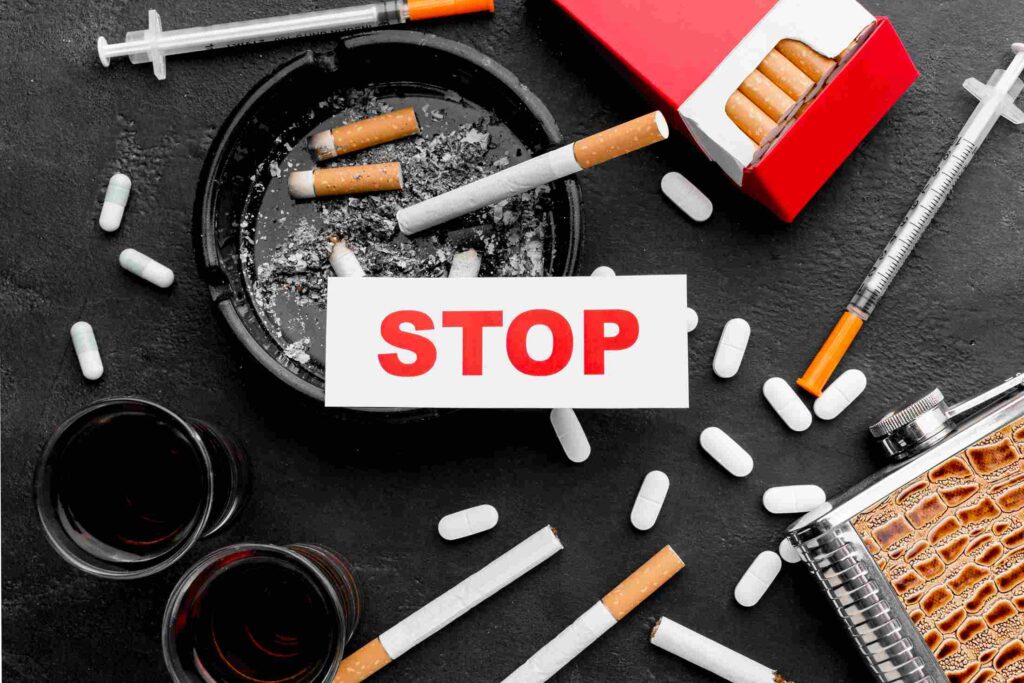
Smoking and alcohol intake have detrimental effects on the skin. Both of them are extremely powerful drying agent that causes dehydration.
The loss of water makes the skin dull and can create fine lines and wrinkles on the face. This is why they are two of the major accelerators of premature skin aging.
Another well-known effect of smoking is the narrowing of blood vessels which also affects the supply of oxygen and necessary nutrients to the outermost layer of skin. Study also shows that smoking increases melanin on the skin which can lead to noticeable dark spots on the face.
On the other hand, alcohol consumption can cause skin inflammation and also damage collagen. It can also impair body’s natural ability to heal wounds. This can significantly worsen acne and other skin issues. So, avoiding them is a necessary lifestyle change to get clear skin.
Stay Away from Mid-Day Sun
Different UV rays are emitted by the sun. UVA rays cause early aging of the skin, whereas UVB rays cause sunburn. It can dilate the small blood vessels under the skin and can also cause dark spots on your skin.
Free radicals produced by these ultraviolet radiation damage cellular structure. They have the power to change amino acids as well as DNA, as well as the membranes that enclose skin cells and destroy or alter the proteins and enzymes necessary for cellular metabolism.
The skin may become less elastic as a result of exposure to these rays over time. Even worse, the skin may start to seem leathery, wrinkled and thin. Your skin ages more quickly the more sun you get.
So stay away from the mid-day scorching sun as much as possible. Always use sunscreen while going outside. A mineral-based sunscreen with zinc oxide in it is the best choice for anyone.
Start Eating Nuts and Seeds
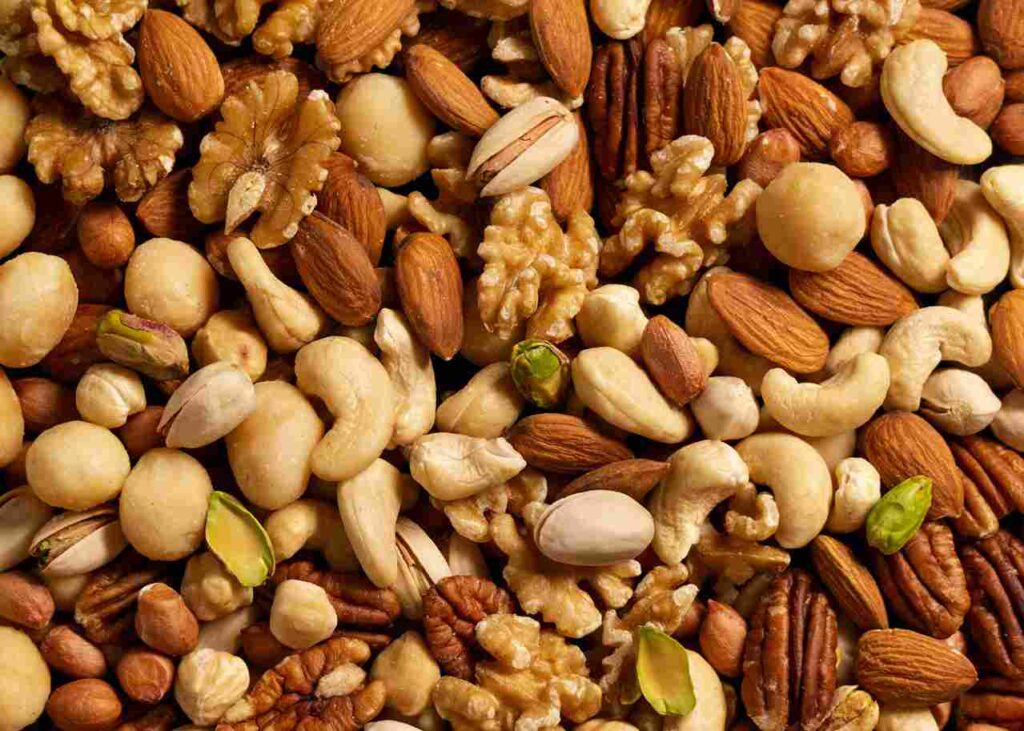
Nuts and seeds are probably the best foods one can eat. They are extremely rich in minerals, antioxidants, vitamins, fiber, proteins, and natural fats that significantly improve how your skin looks.
They’re superfoods for your skin and hair because of their healthy amount of nutrients, healthy fats that stimulate cell regeneration, and various other benefits like lowering inflammation, maintaining a strong metabolism, soothing the skin and improving the healing process.
It is impossible to talk about the health benefits of every nuts and seeds in one article but almost every of them has something special to offer for your skin.
I never had better skin than that I got once I started consuming nuts and seeds regularly. I used to eat walnuts, chia seeds, pumpkin seeds, almonds and a few others during my recovery phase that worked wonders for me.
Walnuts are highly rich in omega-3 fatty acids, the nutrient that is considered one of the best for skin health. They can aid in reducing skin irritation, including issues like eczema and acne. Brazil and cashew nuts are also beneficial for treating acne due to their high selenium level.
Similarly, Almonds are a great source of vitamin E, which can help to shield your skin from UV radiation, keep moisture in, and repair skin tissue. Chia Seeds are an excellent coolant for your body and also help to improve gut health. It is also rich in omega-3 fatty acids.
Walnuts and Chia seeds should be your top options. You can add cashews, almonds, pistachios, flax seeds, pumpkin seeds, watermelon seeds, etc. as you like.
Also Read: 6 Essential Nutrients for Healthy Skin
Start Exercising Daily
Exercise improves the blood circulation in our body while helping in cellular repair or replacement, thus nourishing the skin cells. Improved circulation within the body also helps in better delivery of nutrients to the skin cells.
It also aids in skin cleansing by clearing toxins and pollutants from your pores. Exercising daily can also significantly reduce the stress level of the body.
20-30 minutes of light exercise is more than enough to boost your skin health. You can do endurance exercises like running or yoga like halasana or dhanurasana. You can also add 5 minutes of facial exercise to your daily routine for better results.
Also Read: Best Exercises for Glowing Skin: Incorporate These Into Your Routine
Manage Stress
Skin is one of the body parts that is highly sensitive to stress. You tend to have more acne and breakouts when you are stressed.
One of the things that your skin does under stress is that it starts producing more oil. More oil on skin means more dirt accumulation and clogged pores.
Stress also inhibits the healing process, which results in acne scars remaining visible for a longer period of time. Additional issues are created by the increased skin inflammation caused by the extra cortisol production.
Regular meditation is the most basic stress management technique. When it comes to relieving stress and calming the body, meditation is very beneficial.
Make sure you are getting adequate sleep as well. Sleep of roughly 7-8 hours per day is essential for reducing stress.
Do not Over-Clean/Scrub Your Face
It is not only the dirt that is causing the problem. So do not over-clean or scrub your skin.
In fact, when you scrub your skin, you remove all the friendly bacteria and natural oil that protects your skin. This causes skin irritation, redness and also weakens the skin barrier.
Be gentle while washing your face. Do not use any type of physical exfoliant as it only maximizes the issue.
Remember that maintaining new lifestyle habits requires consistency. It could take some time for your skin’s health to noticeably improve, so be persistent and follow your new routines.






Nice Post.
Great info.